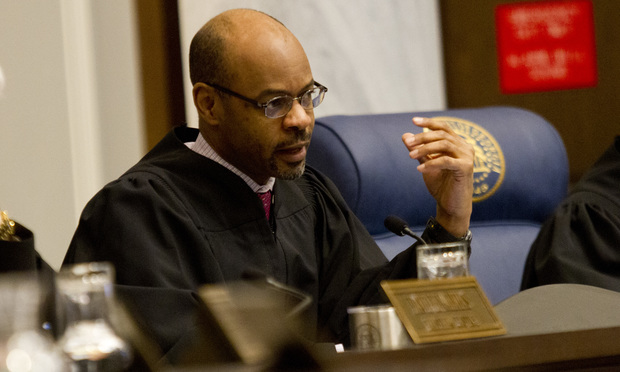Justices Toss Class Action Challenging Hospital Liens Based on Preset Charges
The putative class action was one of several challenging hospitals' use of standard "chargemaster" prices to file liens against patients' potential recovery in tort actions.
June 30, 2020 at 02:44 PM
5 minute read
 Chief Justice Harold Melton, Supreme Court of Georgia. Photo by John Disney
Chief Justice Harold Melton, Supreme Court of Georgia. Photo by John Disney
The Georgia Supreme Court nixed a putative class action claiming a Columbus hospital committed fraud by placing liens seeking the full amount of medical bills on patients, even though the actual negotiated amount billed and paid may be substantially less.
The decision overturned a trial judge and divided Court of Appeals panel in the closely watched case, the first of several similar class actions that had been lined up against Georgia hospitals. The unanimous opinion, written by Chief Justice Harold Melton, said the claims of the proposed class members were too varied to warrant class status, and should be resolved on a case-by-case basis.
"We always felt like The Medical Center was doing what every hospital across the state has been doing for years," said Hall Booth Smith partner Paul Ivey Jr.
"It's unfortunate that it took us going all the way to the Supreme Court to get an opinion settling the issue," said Ivey.
"It just validates that they're doing what they're supposed to do: file a lien for treatment, let the tort case go through the system, and when the dust settles the lien is negotiated," said Ivey.
Ivey said he was aware of at least 14 more pending suits that have been on hold while the issue was resolved.
"It has touched every hospital system in Georgia: Wellstar, Piedmont, MCCG—it's a major decision for all of them," said Ivey, who handled the case with firm colleagues Robert Martin Jr. and Lauren Dimitri, and Troutman Sanders partners Lindsey Mann and William Withrow Jr.
The plaintiff's team includes Frank Lowrey IV, Michael Terry and Michael Baumrind of Bondurant Mixson & Elmore and Charlie and Austin Gower of Columbus' Charles A. Gower P.C.
"While we respect the decision of the court, we continue to believe that the lien practices challenged in this litigation disproportionately affect the most vulnerable Georgians, including uninsured personal injury victims," said Charlie Gower via email. "We are assessing how best to proceed."
As detailed in court filings, the case revolved around the hospital's reliance on set prices for procedures according to its "chargemaster" rate for billing patients.
While everyone is charged that rate on paper, they seldom pay the full rate because third-party payers, including insurers, Medicare and Medicaid, usually negotiate a reduced bill.
The named plaintiff, Danielle Bowden, was a passenger in an Enterprise rental car involved in a wreck in 2011. She was taken to the The Medical Center, which billed her $24,409 for her treatment and filed a medical lien attaching to any recovery she might receive as a result of her injuries.
In 2012, Enterprise offered Bowden its $25,000 policy limits to settle any claims against it, filing an interpleader action and paying that amount into the court registry.
Bowden filed a cross-claim challenging the lien as grossly excessive and not reflective of the actual value of care she received. The Medical Center subsequently offered to accept $8,333 to settle its claim, but Bowden refused.
Bowden's claims against the hospital included unjust enrichment, breach of contract, fraud, negligent misrepresentation, racketeering and deceptive trade practices. An amended complaint sought class status, adding claims by three other Medical Center patients who had been uninsured, injured in auto accidents and subject to hospital liens as class representatives.
Muscogee County Superior Court Judge Maureen Gottfried granted class certification and denied the hospital's motion for summary judgment. It appealed both rulings.
In 2018 a Court of Appeals panel splintered, with Presiding Judge Yvette Miller writing the majority opinion affirming most of Gottfried's orders but agreeing with the hospital that the racketeering and deceptive trade practices claims should be dismissed.
Miller wrote that there was enough commonality among the claims to support class status because the "common question applicable to all class members is whether the chargemaster rate, which universally served as the basis for the lien amount, was reasonable."
Judge E. Trenton Brown concurred in the judgment only and Judge Steve Goss partially dissented, saying class certification was not appropriate.
In Monday's opinion, Melton wrote that the appeals court had itself conceded the proposed class included insured and insured patients, those whose liens had been lifted, and those who had settled their claims and never paid anything.
Such a class is "overbroad in several respects," Melton said, and determining whether the chargemaster rate was appropriate for all of them would require an array of questions and answers defeating commonality.
"Moreover," he wrote, "even if the class were limited to uninsured patients who had a lien filed at the chargemaster rate against any potential tort recovery, commonality would still be lacking. Just because an uninsured patient is billed at the chargemaster rate does not necessarily mean the charge itself is unreasonable for that specific patient."
Even if a jury could arrive at some formula for determining a "reasonable charge," said Melton, determining what that charge is "still varies from class member to class member and is not subject to being resolved 'in one stroke' for the entire class," wrote Melton.
The opinion also said Gottfried and the Court of Appeals had erred in denying The Medical Center's motion for summary judgment on the claims for fraud, negligent misrepresentation and racketeering "against hospitals that properly file liens based on standard chargemaster rates that reflect true market considerations such as hospital costs."
This content has been archived. It is available through our partners, LexisNexis® and Bloomberg Law.
To view this content, please continue to their sites.
Not a Lexis Subscriber?
Subscribe Now
Not a Bloomberg Law Subscriber?
Subscribe Now
NOT FOR REPRINT
© 2025 ALM Global, LLC, All Rights Reserved. Request academic re-use from www.copyright.com. All other uses, submit a request to [email protected]. For more information visit Asset & Logo Licensing.
You Might Like
View All

Upcoming Changes to Medicare Secondary Payer Reporting: What WC Insurers and Attorneys Need to Know
5 minute read
Biden Administration Tells Justices That Bans on Gender Care Are Sex Discrimination

11th Circuit Allows Florida Transgender Health Care Ban to Continue Pending Full Appeal on Constitutionality of Law
Law Firms Mentioned
Trending Stories
- 1'A Death Sentence for TikTok'?: Litigators and Experts Weigh Impact of Potential Ban on Creators and Data Privacy
- 2Bribery Case Against Former Lt. Gov. Brian Benjamin Is Dropped
- 3‘Extremely Disturbing’: AI Firms Face Class Action by ‘Taskers’ Exposed to Traumatic Content
- 4State Appeals Court Revives BraunHagey Lawsuit Alleging $4.2M Unlawful Wire to China
- 5Invoking Trump, AG Bonta Reminds Lawyers of Duties to Noncitizens in Plea Dealing
Who Got The Work
J. Brugh Lower of Gibbons has entered an appearance for industrial equipment supplier Devco Corporation in a pending trademark infringement lawsuit. The suit, accusing the defendant of selling knock-off Graco products, was filed Dec. 18 in New Jersey District Court by Rivkin Radler on behalf of Graco Inc. and Graco Minnesota. The case, assigned to U.S. District Judge Zahid N. Quraishi, is 3:24-cv-11294, Graco Inc. et al v. Devco Corporation.
Who Got The Work
Rebecca Maller-Stein and Kent A. Yalowitz of Arnold & Porter Kaye Scholer have entered their appearances for Hanaco Venture Capital and its executives, Lior Prosor and David Frankel, in a pending securities lawsuit. The action, filed on Dec. 24 in New York Southern District Court by Zell, Aron & Co. on behalf of Goldeneye Advisors, accuses the defendants of negligently and fraudulently managing the plaintiff's $1 million investment. The case, assigned to U.S. District Judge Vernon S. Broderick, is 1:24-cv-09918, Goldeneye Advisors, LLC v. Hanaco Venture Capital, Ltd. et al.
Who Got The Work
Attorneys from A&O Shearman has stepped in as defense counsel for Toronto-Dominion Bank and other defendants in a pending securities class action. The suit, filed Dec. 11 in New York Southern District Court by Bleichmar Fonti & Auld, accuses the defendants of concealing the bank's 'pervasive' deficiencies in regards to its compliance with the Bank Secrecy Act and the quality of its anti-money laundering controls. The case, assigned to U.S. District Judge Arun Subramanian, is 1:24-cv-09445, Gonzalez v. The Toronto-Dominion Bank et al.
Who Got The Work
Crown Castle International, a Pennsylvania company providing shared communications infrastructure, has turned to Luke D. Wolf of Gordon Rees Scully Mansukhani to fend off a pending breach-of-contract lawsuit. The court action, filed Nov. 25 in Michigan Eastern District Court by Hooper Hathaway PC on behalf of The Town Residences LLC, accuses Crown Castle of failing to transfer approximately $30,000 in utility payments from T-Mobile in breach of a roof-top lease and assignment agreement. The case, assigned to U.S. District Judge Susan K. Declercq, is 2:24-cv-13131, The Town Residences LLC v. T-Mobile US, Inc. et al.
Who Got The Work
Wilfred P. Coronato and Daniel M. Schwartz of McCarter & English have stepped in as defense counsel to Electrolux Home Products Inc. in a pending product liability lawsuit. The court action, filed Nov. 26 in New York Eastern District Court by Poulos Lopiccolo PC and Nagel Rice LLP on behalf of David Stern, alleges that the defendant's refrigerators’ drawers and shelving repeatedly break and fall apart within months after purchase. The case, assigned to U.S. District Judge Joan M. Azrack, is 2:24-cv-08204, Stern v. Electrolux Home Products, Inc.
Featured Firms
Law Offices of Gary Martin Hays & Associates, P.C.
(470) 294-1674
Law Offices of Mark E. Salomone
(857) 444-6468
Smith & Hassler
(713) 739-1250






